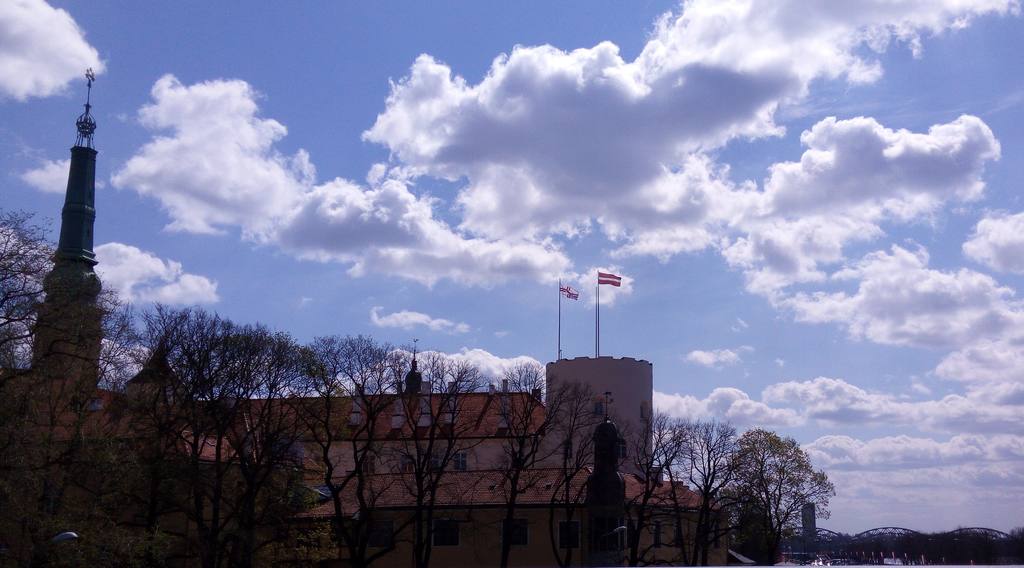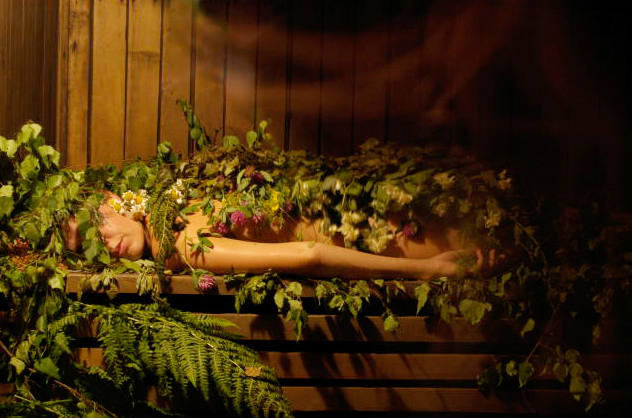Accommodation news
Accommodation news
The summer solstice in June 21-23 is one of the major Latvian summer festivities. Even convinced city people feel tempted to head out for the countryside and be a part of the overwhelming festive mood. Celebrations have to be prepared well in advance with special sort of cheese made, beer brewed, the festive place prepared, the house and yard decorated. There are ancient rituals and beliefs that have to be carried out for fertility of people and earth, to repel evil spirits. How to celebrate – this is up to you. Some will prefer sitting by the fire, eating delicious Jāņu cheese, drinking beer and singing songs with the traditional refrain Līgo, others would join the mystery and magic of ancient Midsummer rituals. To understand what this is all about read more about the Midsummer or Summer Solstice traditions and beliefs. Festive food is a significant part of the celebration with the specialty of the day – the Jāņu cheese. Get to know about its origins and meaning here, and feel tempted to enjoy Midsummer in the countryside!
It’s time to head for the flowering meadows, gather wild flowers, make flower and oak wreaths, and get ready to celebrate Jāņi or Midsummer – on of the most important Latvian national festivities. How to do it? Shall we just sit by a bonfire or join some charismatic ritual practices? Here are ideas – we have collected information on events all over Latvia, from Jūrkalne in the West to Riga and from Riga to Balvi in the East, and we recommend to celebrate Jāņi in the countryside!
Our web site features a new section dedicated to Midsummer celebration and it shortly introduces the traditions, beliefs, festive food, especially, the Jāņu cheese: http://www.celotajs.lv/lv/c/wrth/traditions/events/midsummer.
Did you know that EU is the world’s largest cheese market and there are over 240 varieties of cheese that are protected under EC schemes for protection of agricultural products and food staffs? Three quality logos attest to their specific traditions and qualities: the Protected Designation of Origin (PDO), the Protected Geographical Indication (PGI) and the Traditional Speciality Guaranteed (TSG).
Here you will find information on how 6 countries cooperate to promote cheese as a reason for travelling - going on a cheese tasting tour in home country and abroad. Touring routes, information about cheese festivals, types and sorts of cheese and cheese producers in Canary islands, Malta, Bulgaria, Slovenia, Italy and Latvia.
Find more information on Latvian „Cheese master” routes and cheese farms in our website www.celotajs.lv/lv/c/brand/cheese. Many of these participate in the Countryside Open Days event in May 27-28 this year. Check also the „Tasty cheese tour” website http://www.tastycheesetour.eu.
Latvia starts its way towards celebrations of the 100th anniversary in November 18, 2018. To get to know the country better, it can be explored by 7 special touring routes – the Routes of Latvia’s Statehood. These routes allow you to learn about aspects of Latvia’s history, personalities, places and events that facilitated the establishment of the state and the emergence of its national identity. Full information about the routes: http://www.celotajs.lv/en/c/brand/lv100 .
The spring comes with warm sunlight, lots of outdoor activities and changes in seasonal menus. The countryside turns green with young tree leaves and grasses of all shades. People are eager to start the bicycling season as the countryside offers a variety of scenic cycling routes in forests, along the seashore and on quiet country roads. Adventurous people catch the moment while the water is high in rivers to indulge in kayaking.
Living close to nature, we know how to use its bounty for making invigorating meals that help to wake up after long winter. Latvians make tasty soups and salads using wild sorrel, young nettle and ground-elder. There are spring mushrooms in the forests like false morel.
Sauna has an important role in Latvian culture. It restores the body in physical and spiritual terms. A sauna ritual is an adventure on various levels – healing and purifying the body, concentrating the emotions, learning about yourself, and even experiencing a positive change in one’s consciousness. Sauna rituals are offered by certified and experienced experts, and the rituals make use of gifts from the environment – branch and plant switches, scrubs and body masks from natural and local raw materials. Herbal teas are also offered. In spring time, invigorating sauna ritual can be supplemented by drinking fresh birch saps to restart one’s body and mind.
Drinking birch saps is an old Latvian tradition. Birch sap is like an “energy drink” that helps to invigorate one’s body after long and dark winter period. It is commonly known for its detoxifying, diuretic, cleansing and purifying properties. In spring, usually in April, when the sun warms up the atmosphere, birch saps start to circulate in trees.
In the countryside, bread baking traditions are still strong. There is a great variety of breads. Latvians cherish the old and special ways to make bread. Centuries old recipes and know-how are in favour. The dough is scalded in a trough, kneaded by hand and then lovingly shaped into loaves that are baked in a real wood stove on maple leaves. Many traditional farmsteads open their doors to tourists and invite them to witness the whole process and get involved preparing own loaf to take home. Nothing is tastier than a warm slice of bread with milk and honey served on a nice terrace among blooming apple ad cherry trees on a fresh and sunny spring day.
Along with Christian Easter, Latvian still enjoy the pre-christian traditions of spring solstice. It is celebrated in March – April during the spring equinox. Celebrations can be best held in the countryside as there are many activities that once had a ritual meaning but today can be enjoyed for fun. One of popular traditions is to install big swings and go swinging high like the sun in the sky. For celebrations, Latvians always dye eggs, mostly in onion peels to get deep brown colour with many shades. The egg symbolises the sun and fertility.
Spring solstice traditions, with swinging, eggs and lots of singing can be witnessed in open farms where people organise celebrations for themselves and guests.
Our collection of postcards offers information about things that we, the Latvian people, consider to be important, what makes us proud, and what is special during every season in our Latvian countryside. For the Summer Solstice, Latvians make round, yellow cheese to resemble the sun. In the autumn, we go into the forest to to hunt for mushrooms. During the spring, we tap birch trees to get the sap, and in winter, we enjoy sauna traditions that are hundreds of years old.
A separate series of postcards relates to Latvian cuisine, including cheese, as well as crafts from Latvia.
The latest series of postcards focuses on seven routes that can be traveled to celebrate the centenary of the Latvian state. You will learn about the emergence of Latvian statehood in all of Latvia’s regions.
If you want to delight your friends in Latvia or abroad with a beautiful postcard greeting, then come to the “Lauku ceļotājs” office at Kalnciema Street 40, 3rd floor, in Rīga, where you can get some of the cards.
Available languages: Latvian, German







